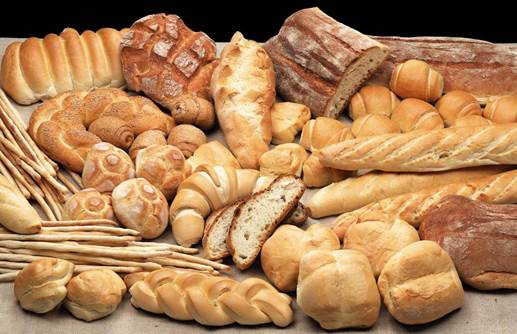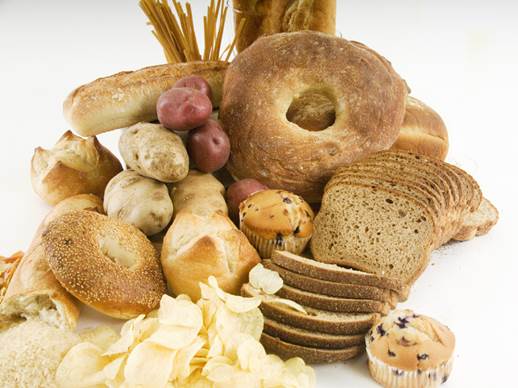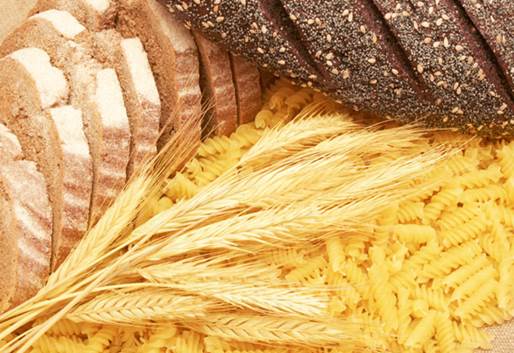Eat bread and still lose weight?
We’ll toast to that!
Carbs can’t live with them, can’t live
without them. When weight loss is the aim, bread, pasta, potatoes and rice are
often the first to come off the menu and there’s nothing like a big bowl of hot
chips to coax you off the wagon! But what if we told you that eating more carbs
was the answer to revving up your fat-loss results?

But
what if we told you that eating more carbs was the answer to revving up your
fat-loss results?
Not all diets work for everyone, but what
we can guarantee is that if you feel restricted or deprived of your favorite
foods, you can wave goodbye to any long-term results. But there are ways of
shedding pounds without tackling temptation every time you see a grain, only to
eventually cave and end up knee-deep in the bread basket. Busting the confusion
over carbohydrates means that you can enjoy and benefit from carbs, rather than
fearing them. The answer? A clever dietary trick called carb cycling that
allows you to fuel up, fight fat and enjoy your food.
Chain reaction
‘Carb cycling means regulating the amount
of carbohydrates you eat, alternating between low and high on different days,’
explains Russell Bouwman, a sports nutritionist at The Nutri Centre
(nutricentre.com). This method of cycling your carb intake sends your body’s
metabolism into a higher gear, allowing you to burn fat on low-carb days, but
keeping you fuelled up and preventing your body from dipping into starvation
mode with high-carb days.

‘Carb
cycling means regulating the amount of carbohydrates you eat, alternating
between low and high on different days,’ explains Russell Bouwman
Boosting lean muscle mass is crucial to fat
loss, but low-calorie diets don’t always support your body’s muscle-building
efforts. Carb cycling can help you bridge the gap between creating lean muscle
and torching fat. ‘Toning or building lean muscle to improve health and
physique often requires enough carbohydrates and calories to support these
aims, while weight loss - although not as simple as calories in versus calories
out - generally requires a strategy of consuming lower carbohydrates and fewer
calories s e body is forced to dip into its fat reserves, Il. ‘The downside of
a long-term low-carb program is that it can rob you of your strength and
energy, which can be an issue if you want to maintain a strong fitness regime.
Carb cycling combines the weight-loss advantages of eating a low-carb diet with
the energy and strength bonuses of a high-carb diet.’
Food for thought
It’s a no-brainer that carbs are an
important part of a healthy diet, particularly if you like to go hard in the
gym, so cutting them out completely is unnecessary - you’d only be
shortchanging yourself! But it is important to eat the right kinds. Basing most
of your meals on high-GI carbs will only put you on the fast track to weight
gain and illness.
‘High carbohydrate foods, particularly
those that are known as high-GI foods, such as white bread, white pasta and
sugary treats, promote insulin production which can result in fat gain,’
explains Russell. ‘Insulin release is the body’s way of signaling to cells to
store energy rather than expend it, which results in increasing fat stores.’

Basing
most of your meals on high-GI carbs will only put you on the fast track to
weight gain - and illness.
So, while replacing foods with a high fat
content with ‘fat-free’ carbs might sound like it could help you shift pounds,
these sugar-filled foods that encourage insulin production aren’t doing your
weight-loss goals any good. They’re harmful to your health as well - high-GI,
processed foods have been linked to obesity and diabetes.
On the other hand, if you’ve ever tried to
stick to a low-cal, low-fat or low-carb diet, particularly while trying to work
out hard, you’ll be familiar with a few of the nasty side effects: a lack of
concentration, a shorter temper and a spike in mood swings. Taking on a carb
cycling routine, however, could equal big benefits when it comes to your mental
focus and the ability to process information effectively. ‘Carbohydrates are
the body’s primary source of glucose, which is essential for brain function,’
Russell says. ‘Plus, research suggests that the brain also uses ketones
(produced from the breakdown of fat) to fuel brain functions. When you’re on a
low-carb diet to induce weight loss, you are said to be in ketosis.’
To put it simply, mixing up your carb
intake might just offer the best of both worlds for your brain and your body.